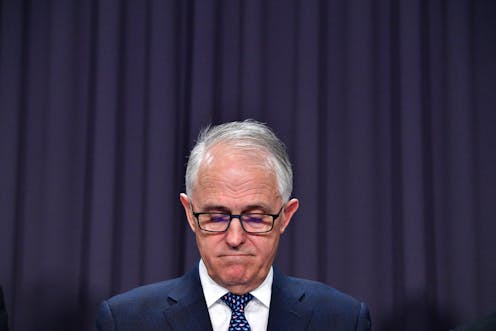Malcolm Turnbull shelves emissions reduction target as leadership speculation mounts
- Written by Michelle Grattan, Professorial Fellow, University of Canberra

Malcolm Turnbull has announced the government will shelve any move to implement the 26% reduction in emissions because it cannot get the numbers to pass legislation in the House of Representatives.
The desperate attempt to quell the rebellion in his ranks comes as Turnbull’s leadership is under mounting pressure, with speculation about a leadership bid sooner or later from Home Affairs Minister Peter Dutton.
Read more: View from The Hill – It's time for Turnbull to put his authority on the line
But Turnbull told a news conference that Dutton had been at Monday morning’s leadership meeting and “has given me his absolute support”.
“I enjoy the confidence of cabinet and of my party,” he declared.
In a package of changes to the National Energy Guarantee, Turnbull announced the government would move for extraordinarily strong measures to be available against companies that do not give consumers a fair deal, including ultimate divestment.
The government has retreated from Turnbull’s Friday compromise move of implementing the 26% reduction target by regulation. That idea, aimed at denying critics the opportunity to cross the floor, sparked a fresh backlash from Coalition MPs who thought it would make it easier for a Labor government to increase the target.
“Our policy remains to have the emissions intensity standard in the legislation,” Turnbull said at a news conference.
But “as John Howard said, politics is governed by the iron laws of arithmetic and in a House of Representatives with a one seat majority, even with strong support in the party room, if a small number of people are not prepared to vote with the government on a measure then it won’t get passed. So that’s the reality.”
He said the government would bring the target legislation forward “where and when we believe there would be sufficient support in the House of Representatives and obviously in our party room to progress this component of the scheme”.
Turnbull has been frantically seeking any means to pacify his critics, as Tony Abbott and other hardliners are determined to use the energy issue to try to bring him down.
However, it is unlikely his latest move will satisfy his most trenchant opponents. Critics such as Eric Abetz are broadening their attacks on Turnbull to call for government policy changes in other areas, including immigration.
Turnbull admitted he had not personally spoken to Labor to determine whether it would support the emissions legislation, which would give it the numbers in the House.
The shelving of the emissions legislation could cause the Labor states – yet to sign off on the National Energy Guarantee – to walk away from the broad NEG scheme.
Under the initiatives to try to drive down electricity prices announced by Turnbull, a “default market offer” would be set, from which all discounts would be calculated.
“Consumers will be able easily to compare offers from different companies and recognise when they’re being ripped off or when they’re getting a fair deal,” Turnbull said.
He said the Australian Competition and Consumer Commission estimated that for average customers on an inflated standing offer, the savings on moving to a new default market offer could range between $183 and $416 a year. For the average small to medium business the move could save between $561 and $1457.
Turnbuil said the ACCC would be given new powers to “step in where there has been abuse or misuse of market power.
"In the most egregious cases of abuse, additional powers will be conferred on government to issue directions on operations, functional separation and even, as a last resort, divestiture of parts of the big power companies,” Turnbull said.
At his news conference, where he was flanked by Treasurer Scott Morrison and Energy Minister Josh Frydenberg, Turnbull rejected a reporter’s suggestion that he had just delivered Tony Abbott’s policy. Abbott has wanted to emission target dropped and Australia to walk away from the Paris climate agreement .
“Our energy policy remains the same, but we are not going to present a bill into the House of Representatives until we believe it will be carried,” Turnbull said.
“We obviously need the support of sufficient of our colleagues to get it passed and that means, you know, substantially all of them.”
On Paris, he said: “We are parties to the Paris Agreement and the government has committed to that”.
The president of the Queensland Liberal National Party, Gary Spence, is urging MPs from Queensland – a vital state at the election – to replace Turnbull with Dutton.
Meanwhile, Western Australian Liberal senator Linda Reynolds strongly backed Turnbull, telling Sky she “absolutely” believed he would be prime minister at the election.
Authors: Michelle Grattan, Professorial Fellow, University of Canberra





